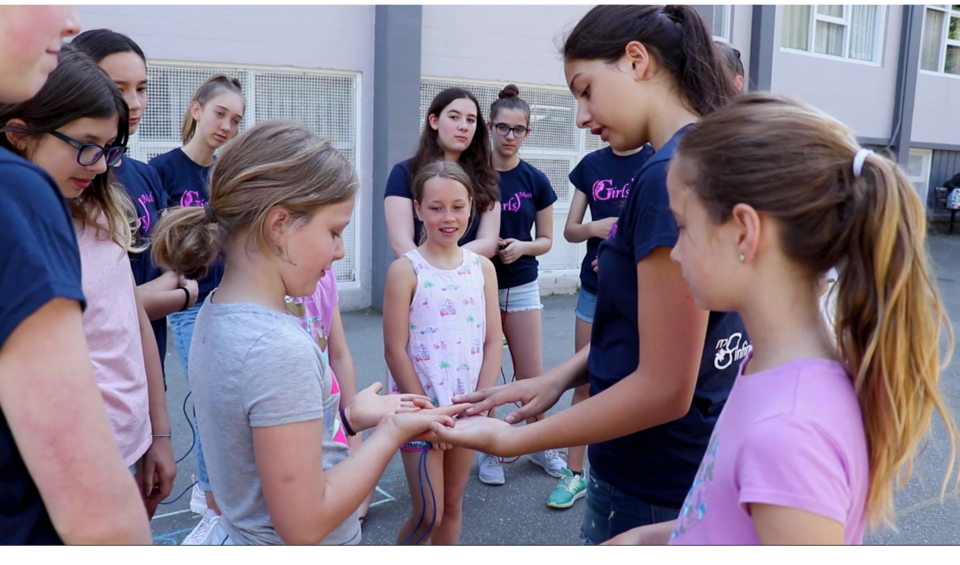While working as a math tutor for a young girl in her neighbourhood, Vancouver’s Alexa Bailey noticed that the girl’s confidence in STEM subjects (science, technology, engineering and math) was already declining, even at an early age. But through the use of games and activities to teach lessons, the girl’s confidence and comprehension improved dramatically.
Seeing the benefits firsthand, Bailey, who was only 14 years old at the time, became curious if other young girls had the same confidence issues when it came to math.
This curiosity led to her conducting a research experiment for her Grade 8 science fair.
Mentored by University of British Columbia’s Dr. Toni Schmader, Bailey created a survey gauging students’ confidence in math and took it to multiple elementary schools in Vancouver.
What she found was while boys’ confidence seemed to stay the same throughout the years, girls’ confidence in STEM subjects dwindled year after year.
“Overall, girls had a statistically significant decline in confidence as they progressed through elementary school,” said Bailey. “I really didn’t want that to happen so that’s why I created Girls to the Power of Math (G^M), an intervention program that targets Grade 3 girls using skip counting, multiplication and fun activities to help boost their confidence and inspire a love of math.”
Now 16 and already a high-school graduate, Bailey is on a gap year before heading off to university where she hopes to study biological engineering. In the meantime, she is living in her family home in Whistler and spending her days volunteering for the Whistler Adaptive Sport Program and Whistler Mountain Safety while working to expand G^M to the elementary schools in town.
The program just got approved for non-profit status, which Jaqueline Maartense, one of the locals who is helping Bailey get the program up and running in Whistler, said was an important first step in getting the program going. The next step is to find local teenage girls who want to volunteer their time to be the program’s mentors.
“You don’t have to be a math expert, but you need to enjoy working with children and it probably would help if you knew your times tables up to 10,” said Maartense about what they are looking for in a mentor.
“But we are really looking for people who are motivated about being leaders in the local community and want to help inspire other human beings to be the best they can be.”
Those that are interested in being a mentor can send their resume and cover letter to Maartense at [email protected].
Whistler Secondary School’s math club leader, Sarah Hycriw and former Whistler Waldorf Secondary math teacher Hannah Bostrum are also assisting Bailey and Maartense get the program off the ground.
Hycriw will act as the staff supervisor for the program while Bostrum will oversee the training of the mentors to get them up to speed and capable of teaching their own groups of ten students.
The free program, funded by the Actuarial Foundation of Canada, aims to add a math spin to classic childhood games like hopscotch, tag, jackpot and jump rope. However, according to Bailey, the kids’ favourite game always ends up being a variation of “What time is it Mr. Wolf” that they call “What Times is it Mrs. Wolf” where the wolf gives out a math problem, like 3 x 6, and the students must skip count (three, six, nine…) with each step until they reach the answer.
While it is open to any girls aged approximately seven to 12 years old, the program is targeted towards Grade 3 girls because that is when Bailey’s research showed that girls’ confidence in math started to drop. It also lines up with when students would normally be learning their times tables.
However, Bailey said the goal of the program isn’t to teach the kids their times tables, although that would be a good takeaway as well. The goal is to give the kids positive experiences with math and show them that math can be fun.
“The goal is for the kids to enjoy themselves and have fun doing math so that they associate math with a fun experience and can remember this in later years when they might be struggling or they think they can’t do it, they can look back on this experience and say, ‘Hey math is fun and I can do this,’” she said.
“I am proud that I’m able to impact all of these girls lives and hopefully change their outlook on math and inspire a love of math for them. I really hope to see the gender gap in STEM related fields decrease within my lifetime and I’m proud I made something meaningful and sustainable and that I can touch as many girls lives as possible.”




